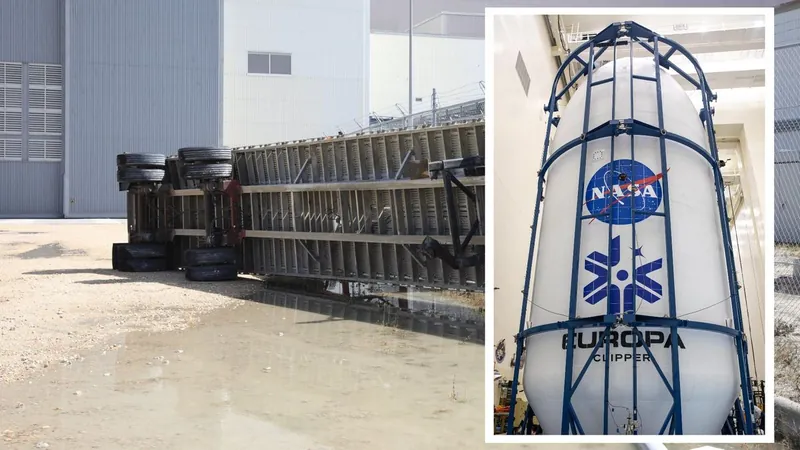
NASA Postpones Europa Clipper Launch to Jupiter to October 14 Amid Post-Hurricane Inspections!
2024-10-12
Author: Li
NASA Postpones Europa Clipper Launch to October 14 Amid Post-Hurricane Inspections!
NASA's much-anticipated Europa Clipper mission, aimed at unraveling the mysteries of Jupiter's icy moon, Europa, has been delayed once again. The launch, originally scheduled for October 10, is now expected to take place no earlier than October 14. This setback is due to extensive additional checks being conducted by NASA and SpaceX to ensure the spacecraft is ready following the impacts of Hurricane Milton, which recently swept through Florida, affecting the Kennedy Space Center (KSC), the launch site for the mission.
The Europa Clipper mission is an ambitious $5 billion project designed to study Europa, a moon believed to house vast plumes of water erupting from a subsurface ocean—possibly even more water than exists in all of Earth's oceans combined. Mission scientists are eager to probe beneath Europa's thick ice shell to assess the moon's habitability, a key factor in the search for extraterrestrial life.
In an update released on Friday, October 11, NASA explained: "Following Hurricane Milton, teams are continuing to do checkouts to ensure flight readiness." The storm battered the Florida coast, necessitating a comprehensive assessment of potential damage at KSC. Fortunately, initial evaluations show only minor damage, allowing employees to safely return to site operations.
As the countdown to launch continues, pictures shared by KSC officials revealed some damage, including an overturned flatbed truck trailer and minor structural impacts, but nothing that could jeopardize the mission. NASA is under pressure to launch the Europa Clipper by November 2 during the current planetary alignment that will optimize its trajectory to Jupiter, with the aim of arriving at Europa around April 11, 2030.
The spacecraft, sitting atop a SpaceX Falcon Heavy rocket at Launch Pad 39A, carries an array of cutting-edge instruments designed to measure Europa's gravitational field, analyze its thin atmosphere, and utilize radar technology to penetrate the ice and analyze the ocean beneath.
While no exact launch time has been confirmed for October 14, NASA's schedule anticipates a liftoff around 12:06 p.m. EDT (16:06 GMT). Keep your eyes on the skies, because this groundbreaking mission could provide humanity's best chance yet at discovering signs of life beyond Earth!
With so much riding on the launch and the ongoing checks, will the Europa Clipper embark on its journey to unravel the secrets of the universe on schedule? Only time will tell!


 Brasil (PT)
Brasil (PT)
 Canada (EN)
Canada (EN)
 Chile (ES)
Chile (ES)
 España (ES)
España (ES)
 France (FR)
France (FR)
 Hong Kong (EN)
Hong Kong (EN)
 Italia (IT)
Italia (IT)
 日本 (JA)
日本 (JA)
 Magyarország (HU)
Magyarország (HU)
 Norge (NO)
Norge (NO)
 Polska (PL)
Polska (PL)
 Schweiz (DE)
Schweiz (DE)
 Singapore (EN)
Singapore (EN)
 Sverige (SV)
Sverige (SV)
 Suomi (FI)
Suomi (FI)
 Türkiye (TR)
Türkiye (TR)